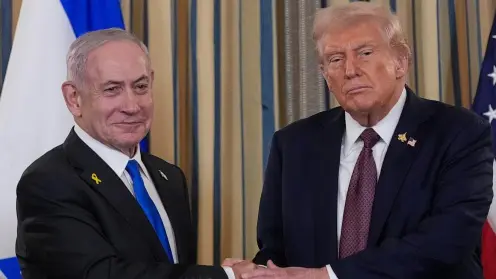October 3, 2025
The UAE pressed Israeli Prime Minister Benjamin Netanyahu to support Donald Trump’s Gaza peace plan and warned against annexation of the West Bank.

The United Arab Emirates (UAE) has urged Israeli Prime Minister Benjamin Netanyahu to align with former U.S. President Donald Trump’s Gaza peace plan, emphasizing that unilateral actions such as the annexation of parts of the occupied West Bank could derail regional stability and undermine prospects for peace.
During recent high-level discussions, UAE officials conveyed strong concerns to Netanyahu, underscoring that continued conflict in Gaza poses risks not only to Palestinians and Israelis but also to the wider Middle East. The UAE’s message was clear: advancing Trump’s Gaza plan—originally presented in 2020—could be a viable path forward if treated as a basis for negotiation.
The UAE Foreign Ministry, led by Sheikh Abdullah bin Zayed Al Nahyan, reiterated that annexing land in the West Bank would be a direct violation of international law and United Nations resolutions. Such a move, officials warned, could strain Israel’s normalization agreements under the Abraham Accords and damage regional trust.
The Trump administration’s Middle East peace plan, also known as the “Deal of the Century,” proposed economic incentives for Palestinians alongside security guarantees for Israel. While controversial, the plan aimed to bring both parties to the table by offering financial aid, infrastructure projects, and investment opportunities, particularly in Gaza.
The UAE, which signed a normalization agreement with Israel in 2020, views the plan as a potential starting point rather than a final settlement. By urging Israel to support aspects of it, the UAE signals its willingness to play a mediator role in reviving stalled peace talks.
Netanyahu has repeatedly suggested extending Israeli sovereignty over parts of the West Bank, a position that has drawn criticism from the international community. For the UAE, any such action risks reigniting tensions, destabilizing Arab-Israeli relations, and potentially undoing years of diplomacy.
The UAE’s warning reflects a broader Arab concern: that annexation would not only undermine Palestinian statehood prospects but also trigger unrest across the region, complicating economic and security partnerships.
Since signing the Abraham Accords in 2020, the UAE has expanded trade, investment, and technology cooperation with Israel. However, Emirati officials have consistently stated that normalization cannot come at the expense of Palestinian rights.
By pressing Netanyahu, the UAE aims to balance its new relationship with Israel with its traditional support for Palestinian statehood. The message is strategic: peace and cooperation are sustainable only if both sides make concessions that lead to a two-state solution.
The UAE’s stance is aligned with calls from the European Union, United Nations, and Arab League, all of which oppose annexation and encourage a negotiated settlement. By positioning itself as a key voice, the UAE is seeking to strengthen its role as a diplomatic bridge between the West, Israel, and the Arab world.
The UAE’s diplomatic engagement with Netanyahu highlights the challenges and opportunities in the region’s complex peace process. By promoting Trump’s Gaza plan as a starting framework while firmly opposing annexation, the UAE is trying to strike a balance between pragmatism and principle.
This development reinforces the UAE’s role as a proactive player in Middle Eastern diplomacy—one that seeks to ensure that peace, stability, and economic growth remain achievable goals despite ongoing conflicts